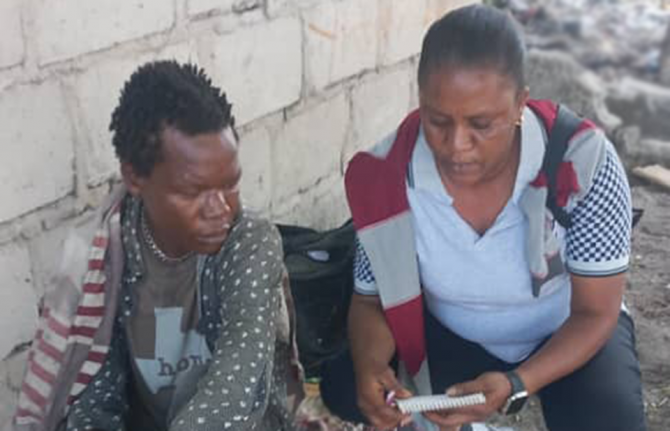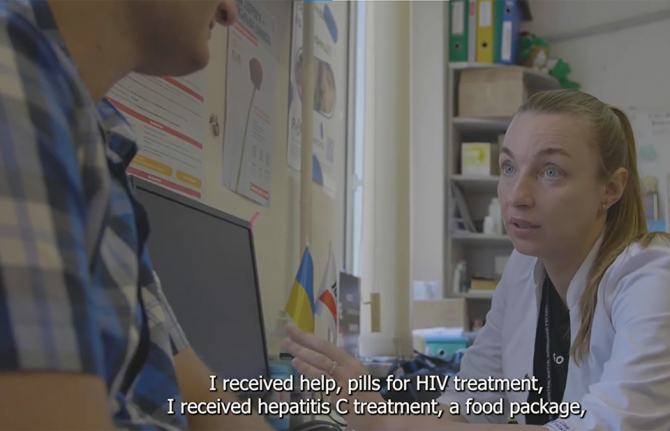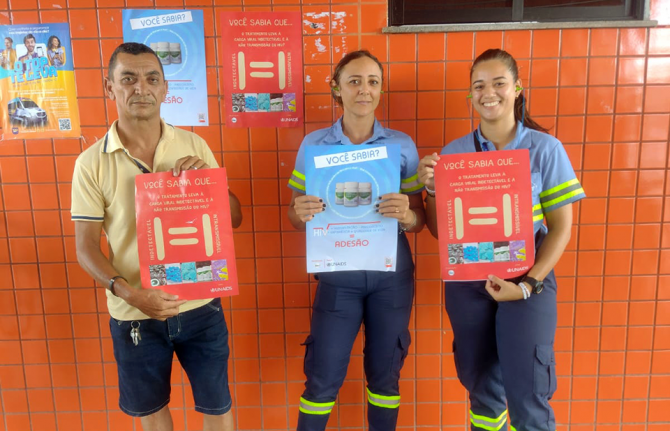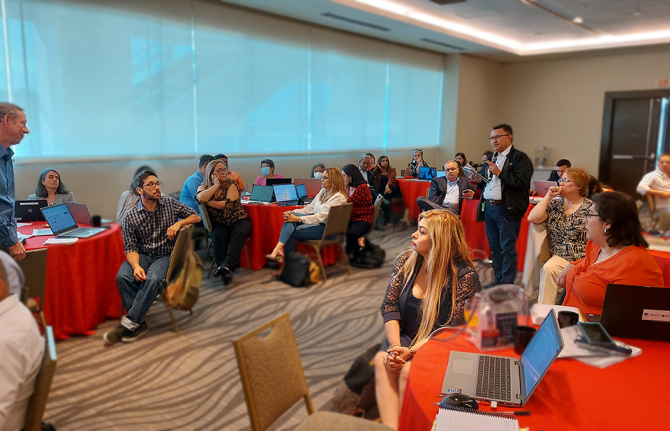
Feature Story
UNAIDS Board members learn about Kenya’s AIDS response
28 November 2011
28 November 2011 28 November 2011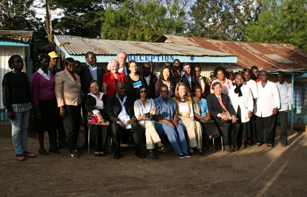
Credit: UNAIDS
A delegation of the UNAIDS Programme Coordinating Board (PCB) has just concluded a field visit to Kenya. The delegation learned first hand about the government’s strong commitment to a multi-sectoral and integrated AIDS response, including working with civil society organizations in planning and delivering HIV services.
With 1.6 million people currently living with HIV out of a population of 40 million, Kenya has the second largest epidemic in East and Southern Africa and the fourth largest globally.
The PCB delegation included the chair (El Salvador), vice chair (Poland), representatives from Congo, Finland, Mexico, Thailand, PCB NGOs from Africa and Asia Pacific, UNHCR and the UNAIDS Deputy Executive Director, Management and External Relations.
The delegation met with government representatives, including from the Ministry of State for Special Programmes, the National AIDS Control Council (NACC) and the National AIDS and STI Control Program (NASCOP), and civil society organizations.
“We have had the privilege of meeting with a range of institutions and individuals who have been the driving force behind Kenya’s progress in its national AIDS response,” said Jan Beagle, UNAIDS Deputy Executive Director, Management and External Relations. “While challenges remain, we are encouraged by the combination of political will at the highest level, grass-roots activism and support of all partners in advancing the response in Kenya.”
The delegation also met representatives of networks of people living with HIV, children heading households and HIV discordant couples (where only one partner is infected with HIV) during their field visit to Kibera—the largest informal settlement in Eastern Africa. They also visited a Millennium Village Project (MVP) in Nyanza Province, where the delegation witnessed an example of a community and family-centred integrated approach where peer mothers, male champions and community health workers each play a key role in preventing new HIV infections among children.
While challenges remain, we are encouraged by the combination of political will at the highest level, grass-roots activism and support of all partners in advancing the response in Kenya
UNAIDS Deputy Executive Director, Management and External Relations, Jan Beagle
“The Gongo Health Centre in Sauri is a good example of comprehensive and integrated services being made accessible by trained personnel in an efficient manner to those most in need in a rural setting,” said Dr Nieto, Director of the National HIV/STI/AIDS Programme, from the Ministry of Health, El Salvador, current chair of the PCB. “It is a successful model that can and should be replicated in other countries,” she added.
The visit also addressed the crucial role of cultural and traditional leaders, as well as faith-based organizations, in responding to stigma and discrimination against people living with and affected by HIV. The delegation met with the Luo Council of Elders and participated in a meeting of faith-based organizations which focused on the role of these organizations in scaling up HIV prevention and addressing stigma and discrimination.
Kenya’s efforts in promoting a rights-based approach for people living with HIV was evident when the delegation met with the HIV Equity Tribunal that has been established to increase access to justice for people affected by HIV. The Tribunal takes on civil cases of HIV-related stigma and discrimination and is one of the first of its kind in the world.
The delegation also met with representatives of key populations at higher risk, which account for 30% of HIV transmission in the country. “Despite a restrictive legal environment for men who have sex with men, sex workers and people who inject drugs, Kenya has shown that programmes can be extended to key populations at higher risk with the commitment of national AIDS authorities,” said Nadia Rafif, the PCB NGO representative for Africa.
As Kenya’s AIDS response is reliant on external funding–more than 80%—the delegation welcomed the commitment of the Kenyan government to address the issue of sustainable financing and increase domestic resource allocation for HIV.
Resources
Related

Feature Story
Ahead of World AIDS Day UNAIDS Goodwill Ambassador Naomi Watts meets with mothers living with HIV in India
28 November 2011
28 November 2011 28 November 2011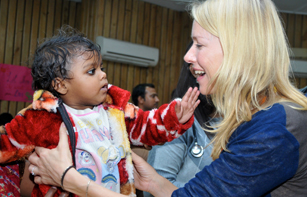
UNAIDS Goodwill Ambassador Naomi Watts during her visit to Safdarjung Hospital in New Delhi.
Ahead of this year’s World AIDS Day (1 December), UNAIDS Goodwill Ambassador Naomi Watts travelled to Safdarjung Hospital in New Delhi, India, to meet with mothers living with HIV and find out about some of the challenges they face in their daily lives.
Ms Watts toured the hospital and met with a group of mothers on the HIV ward. “I felt the many challenges they face, including the impact of stigma and shame, and yet it was their strength and determination to raise healthy children that shone through. We need to ensure that all mothers living with HIV get the services they and their families need. No mother needs to lose a child to AIDS and no child needs to be orphaned by AIDS.”
Safdarjung Hospital is a multi-specialty hospital in New Delhi and one of the largest government hospitals in India. The hospital provides medical care to people from across the country free of cost, including HIV prevention, treatment care and support services.
We need to ensure that all mothers living with HIV get the services they and their families need
UNAIDS Goodwill Ambassador Naomi Watts
During her visit, Ms Watts was greeted by staff of the hospital, who guided her through different HIV facilities that Safdarjung Hospital offers including preventing new infections in children. Ms Watts met with hospital staff and was able to get new insights into how HIV prevention programmes are run in India.
“We test over 400 men and women from across India per day,” said Dr Renu Arora, Head of the Preventing Parent to Child Transmission of HIV Centre at Safdarjung hospital. She highlighted, however, that about 15% of pregnant women living with HIV across India seek treatment too late in their pregnancies—immediately before or during labour—and that they give birth to about 50% of all HIV-positive children in the country.

Ms Watts spent time talking with women living with HIV, discussing the challenges they face including stigma.
Ms Watts spent time talking with women living with HIV, discussing the challenges they face including stigma. She learned that the virus just doesn’t impact the women but their communities and families as well––emotionally and financially. Stigma and discrimination create a silence that prevents women from coming forward to access vital HIV prevention information and services both in India and across the world.
Sukhhvinder Kaur said, “I was diagnosed with HIV while I was pregnant. My in-laws abandoned my baby and me and we now live with my parents without any financial support. If people had more awareness about HIV maybe my child and I would be accepted in society.”
There are an estimated 2.4 million people living with HIV in India, one of the countries with the highest numbers of people living with HIV globally.

Feature Story
Doha+10: More people accessing HIV treatment
22 November 2011
22 November 2011 22 November 2011
UNAIDS Executive Director Michel Sidibé speaking at the symposium.
Credit: Eric Roset
To mark the tenth anniversary of the Doha Declaration on TRIPS and Public Health adopted in November 2001, UNAIDS released a study evaluating how the use of the TRIPS flexibilities has helped improve access to antiretroviral therapy over the past decade.
Today, nearly half of people eligible for HIV treatment in low- and middle-income countries are now receiving it – 6.6 million out of the 14.2 million eligible - compared to 300,000 in 2002. The most dramatic increases in antiretroviral therapy coverage have occurred in sub-Saharan Africa, with a 30% increase between 2009 and 2010 alone.
This effective scaling up of access to antiretroviral therapy has been largely due to a drastic fall in antiretroviral drug prices over the past decade. In 2000, three-drug antiretroviral therapy combinations cost US$ 10 000–15 000 per person, per year. Today the price for a similar regimen is less than US$ 120 per person, per year in many countries - a 99% reduction in cost.
UNAIDS recognizes the positive impact of the World Trade Organization’s Declaration on Trade-Related Aspects of Intellectual Property (TRIPS) and Public Health, otherwise known as the Doha Declaration. The Declaration clarified the scope of the TRIPS agreement and provided guidance for implementing TRIPS flexibilities to improve access to affordable medicines, including generic antiretroviral drugs and other essential drugs for AIDS-related illnesses.
“Although we have seen significant progress in the first decade since the Doha Declaration was adopted, much more needs to be done in the second decade if we are to achieve universal access to HIV prevention, treatment, care and support,” said Michel Sidibé, UNAIDS Executive Director. “Nearly half of people eligible for HIV treatment are now receiving it, but we have to redouble our efforts to ensure that children and adults everywhere have access to antiretroviral therapy.”
Although we have seen significant progress in the first decade since the Doha Declaration was adopted, much more needs to be done in the second decade if we are to achieve universal access to HIV prevention, treatment, care and support
UNAIDS Executive Director Michel Sidibé
The UNAIDS Executive Director was participating in a one-day symposium hosted by Geneva’s Graduate Institute of International and Development Studies, entitled “10 Years after the Doha Declaration: The future agenda at the interface of Public Health, Innovation and Trade”. Keynote speakers included Margaret Chan, Director-General of the World Health Organization, Pascal Lamy, Director-General of the World Trade Organization and Francis Gurry, Director-General of the World Intellectual Property Organization.
Over the past decade, the Doha Declaration has had a positive impact on increasing access to affordable medicines in low- and middle-income countries. Over 60 low- and middle-income countries have proactively used the TRIPS flexibilities to promote the production and purchase of generic antiretrovirals, according to the study findings. By using these flexibilities to introduce generic competition, countries, including Brazil, Malaysia, and Thailand, have been able to bring down the prices of originator medicines.
Furthermore, the United Nations Development Programme, the World Health Organization, the World Trade Organization, and the Global Fund to Fight AIDS, TB and Malaria have adopted clear policies supporting the use of TRIPS flexibilities. Civil society groups have used the Doha Declaration in their advocacy campaigns to support HIV treatment. Additionally, generic companies have increased investments in antiretroviral production. Today, close to 90% of the 6.6 million people in low- and middle-income countries accessing antiretrovirals use generics.
To expand access to HIV treatment in the future, including access to pediatric formulations of antiretrovirals, a greater number of countries will need to consider using the TRIPS flexibilities. Innovative mechanisms such as the Medicines Patent Pool*, and UNITAID will need to be leveraged.
The UNAIDS study is based on an extensive review of policy documents on the Doha Declaration and the use of TRIPS flexibilities in low- and middle-income countries.
The Medicines Patent Pool was established in 2010 with the support of UNITAID. Multiple patents are ‘pooled’ and licensed out by one entity, in order to cut down on transaction costs for all parties involved. This allows more affordable and more adapted versions of patented drugs to be produced as generics, long before their 20-year patent terms run out.
External links
Related

Feature Story
ASEAN leaders commit to “getting to Zero”
22 November 2011
22 November 2011 22 November 2011
Credit: MC ASEAN/Nyoman Budhiana
The Heads of State and government from the ten countries that make up the Association of Southeast Asian Nations (ASEAN) have committed to making Zero New HIV Infections, Zero Discrimination and Zero HIV Related Deaths a reality, in a declaration adopted at the 19th ASEAN Summit in Bali, Indonesia (17-19 November 2011).
Reinforcing the commitments made at the High Level Meeting on AIDS in June 2011, the leaders—from Brunei Darussalam, Cambodia, Indonesia Lao People’s Democratic Republic, Malaysia, Myanmar, the Philippines, Singapore, Thailand and Viet Nam— pledged to, by 2015, halve sexual transmission of HIV and HIV transmission among people who use drugs and ensure accelerated efforts to achieve the goal of universal access to antiretroviral treatment. They also agreed to push towards eliminating new HIV infections among children in the next five years.
The 2011 Declaration details specific commitments by the ten ASEAN countries to ensure that adequate financial resources are provided for scaling up evidence-based HIV prevention programmes for key populations at higher risk such as people who use drugs, sex workers, men having sex with men and transgender people.
We underline the importance of effective and comprehensive response to prevent and reduce the number of new infections and provide appropriate treatment, care and support to key affected populations and other vulnerable groups
President of Indonesia and Chair of the 19th ASEAN Summit, Susilo Bambang Yudhoyono
"We underline the importance of effective and comprehensive response to prevent and reduce the number of new infections and provide appropriate treatment, care and support to key affected populations and other vulnerable groups," said President of Indonesia and Chair of the 19th ASEAN Summit, Susilo Bambang Yudhoyono, in his Chair’s Statement at the close of the Summit.
The ten ASEAN nations underlined the importance of ensuring financial sustainability, national ownership and leadership for improved regional and national responses to HIV. Through the declaration they committed to ensuring mobilization of a greater proportion of domestic resources for the AIDS response in the spirit of shared responsibility.
“These bold commitments by ASEAN leaders recognize the need for shared responsibility and that we are at a game changing moment for the AIDS response,” UNAIDS Executive Director Michel Sidibé . “To capitalize on the opportunities before us, the world must invest sufficiently today, so we will not have to pay forever.”
Through the Declaration, ASEAN Sectoral Ministerial Bodies as well as other relevant bodies are tasked with implementing the outlined commitments with all ASEAN Member States encouraged to support in accomplishing the goals.
External links
External links
Publications
Publications

Feature Story
German ministries for health and economic cooperation host HIV prevention conference
22 November 2011
22 November 2011 22 November 2011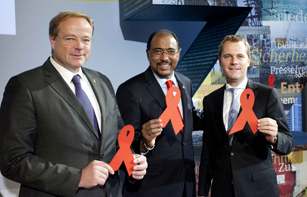
L to R: German Federal Minister for Economic Cooperation and Development (BMZ), Dirk Niebel, UNAIDS Executive Director Michel Sidibé, German Federal Minister of Health (BMG), Daniel Bahr.
Photo credit: UNAIDS/ C. Koall
“Health.Right.Now” was the theme of a one-day high-level conference held in Berlin on 21 November focusing on HIV prevention and human rights. Co-hosted by the German Federal Ministry for Economic Cooperation and Development (BMZ) and the Ministry of Health (BMG), the conference was attended by more than 150 participants including representatives from German and international civil society organizations, networks of people living with HIV, ministries and the United Nations.
The aim of the conference was to discuss ways to overcome the barriers many key populations at higher risk of HIV infection encounter when accessing HIV prevention, treatment, care and support services.
UNAIDS Executive Director Michel Sidibé delivered the keynote address at the conference. In his speech, Mr Sidibé outlined the progress made during the past year in HIV science, in particular the treatment for prevention approach as well as the leadership shown by countries, especially when adopting the 2011 Political Declaration on AIDS. He equally spoke on the challenges facing the response, from funding cutbacks to misalignment of HIV prevention programmes in many countries.
Mr Sidibe commended Germany for its effective and pragmatic approach to HIV prevention, treatment, care and support, as well as its long history in overcoming stigma and discrimination.
Germany has been at the forefront of the AIDS response by putting people at the centre of its approach to HIV prevention and treatment and addressing stigma and discrimination
UNAIDS Executive Director Michel Sidibé
“Germany has been at the forefront of the AIDS response by putting people at the centre of its approach to HIV prevention and treatment and addressing stigma and discrimination,” said Mr. Sidibé, in the presence of the Minister of Health, Daniel Bahr, and the Minister for Economic Development and Cooperation, Dirk Niebel. “Your participation here today shows your commitment to helping shape the destiny of the epidemic.”
In their remarks, the Federal Ministers expressed their concerns over the growing epidemic in Eastern Europe and called for a unified response.
In a separate meeting with Federal Ministers Bahr and Niebel, the UNAIDS Executive Director thanked Germany for its support of the global AIDS response and its contributions to UNAIDS. Mr Sidibé presented an overview of the UNAIDS Investment Framework— intended to support better management of national and international AIDS responses— and plans to work with countries to ensure efficiency gains from the resources available.
The conference is part of the BMZ’s 50th anniversary celebrations, a year-long campaign assessing Germany’s engagement in international development and its future development policy.
On the sidelines of the conference, UNAIDS launched its 2011 World AIDS Day Report. Federal Ministers Niebel and Bahr and Silke Klumb, the CEO of Germany’s national AIDS organization, Deutsche AIDS-Hilfe, joined Mr Sidibé at a press conference to release the report.

Feature Story
African leaders define shared responsibility for the AIDS response
20 November 2011
20 November 2011 20 November 2011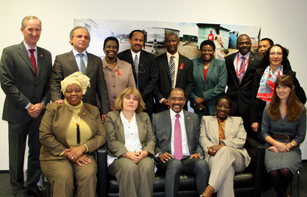
Credit: UNAIDS
“Africa is taking ownership of its AIDS response”. That was the message sent by all participants during a consultation organized by UNAIDS on 16 November 2011 at UNAIDS Headquarters in Geneva.
The UNAIDS Executive Director convened a group of high level representatives from leading political, economic and regional institutions in Africa to identify the changes that will be required to the way decisions and investments are made and to the roles played by governments, donors and civil society in the response.
The aim of the consultation was to identify opportunities to mobilize African and other leaders to accelerate progress towards the new goals of the 2011 Political Declaration on HIV/AIDS, particularly the elimination of HIV infections among children and putting 15 million people on HIV treatment by 2015. The group offered a series of proposals on how to create a socially sustainable agenda for AIDS given the challenges and opportunities of a complex, varied and quickly evolving context.
“The message we need to take to leaders is that they have the power to create change in their countries,” said the meeting co-chair, Commissioner Bience Gawanas of the African Union Commission.
Much of the discussion recounted how the world has moved on from the donor/recipient development paradigm that characterized the past 50 years. Participants cast an image of a very different Africa emphasizing key developments including its remarkable economic growth, the rising share of working age people to further foster growth and increased access to technology and communication. Also highlighted was the increasing number of countries no longer dependent on aid and the accompanying leadership and independence it has brought.
The message we need to take to leaders is that they have the power to create change in their countries
Commissioner Bience Gawanas of the African Union Commission.
According to participants, ushering in a new era of shared responsibility will depend on seizing these opportunities as well as responding to several remaining challenges including the lack of a strong African voice in global health governance, a pervasive “dependency mindset” and Africa’s unsustainable reliance on foreign-produced and -funded HIV treatment.
Participants explored how to better engage parliamentarians, civil society, regional economic commissions, the private sector and ministers of finance and foreign affairs, recognizing that all have a key role to play in sustaining the response. They also discussed innovative, African-owned accountability mechanisms like AIDS Watch Africa and the Campaign on Accelerated Reduction of Maternal, New Born and Child Mortality. New South-South and innovative continent-wide resource mobilization initiatives, such as those led by the African Development Bank, were also explored.
Participants included Dr Agnes Soucat, African Development Bank; Honourable Gilbert Mangole, Member of Parliament of Botswana; Ms Thokozile Ruzvidzo, United Nations Economic Commission for Africa; Dr Lucica Ditiu, StopTB Partnership; Dr Akram Ali Eltom, Global Fund to Fight AIDS, Tuberculosis and Malaria; Dr Alvaro Bermejo, International HIV/AIDS Alliance; Dr. Jeanetta K. Johnson, West African Health Organization; and Dr Faria de Brito Carlos Pedro, West African Health Organization. The consultation was held on 16 November 2011 at UNAIDS Headquarters in Geneva.
UNAIDS Executive Director Michel Sidibé stated that “leaders understand that the response is not about cost, it is about investing in the transformation of our societies.” Participants concluded that the urgency now is to engage African leaders in nationally-led processes to redefine the AIDS response and reprogramme investments based on national priorities.
Related
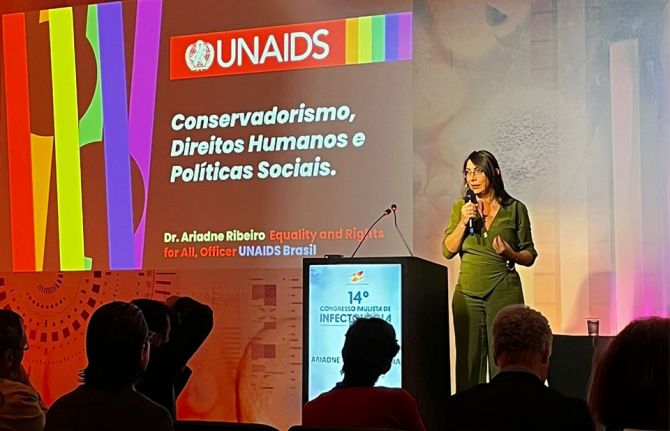 Upholding dignity for everyone: Ariadne Ribeiro Ferreira
Upholding dignity for everyone: Ariadne Ribeiro Ferreira

21 November 2024

Feature Story
UNAIDS releases global guidelines to monitor progress on the implementation of the 2011 Political Declaration on HIV/AIDS
18 November 2011
18 November 2011 18 November 2011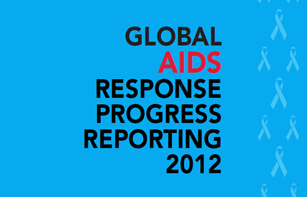
At the 2011 United Nations General Assembly High Level Meeting on AIDS that took place in June in New York, Member States adopted a new Political Declaration entitled “Intensifying our Efforts to Eliminate HIV/AIDS”, which contains new targets to effectively respond to the AIDS epidemic.
The new Political Declaration, as the one adopted in 2001 did, mandates countries to report to the UNAIDS Secretariat every two years on progress made in achieving the new commitments as well as UNAIDS to support countries in reporting back. It also provides for the UN Secretary-General to report regularly to the General Assembly on progress achieved in realizing these commitments.
In order to help countries produce standardized reports to effectively measure the state of the epidemic, UNAIDS has released the new guidelines on Global AIDS Response Progress Reporting 2012. The guidelines outline a set of core global indicators designed to help countries assess the current state of their national AIDS response and progress made in achieving their national HIV targets. They will contribute to a better understanding of the global AIDS response, including progress towards meeting the global targets set in the 2011 Political Declaration as well as the Millennium Development Goals.
The new global guidelines replace the UNGASS reporting ones that were based on the 2001 UN General Assembly Special Session on HIV and AIDS and which saw the submission of reports by 182 out of 192 Member States in 2010.
UNAIDS encourages UN Member States to continue their outstanding record of reporting on national progress on AIDS and to submit their next Country Progress Reports on AIDS by 31 March 2012.
For more information on the Global AIDS Response Progress Reporting please visit www.unaids.org/aidsreporting or contact the team at aidsreporting@unaids.org
Publications

Feature Story
Global Fund implementers meeting: opportunities and challenges
17 November 2011
17 November 2011 17 November 2011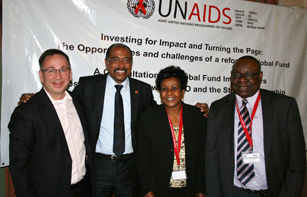
(L to R): The Vice-Chair of the Global Fund Policy and Strategy Committee, Todd Summers, UNAIDS Executive Director Michel Sidibé, Minister of Health of Eritrea, Amina Nurthussein Abdelkadir and Minister of Health of Ghana, Joseph Yieleh Chireh.
The Global Fund to fight AIDS, Tuberculosis and Malaria has initiated a number of actions and processes to strengthen its oversight and accountability mechanisms. These new processes will be discussed at the upcoming 25th Global Fund Board meeting that will take place in Accra, Ghana from 21 – 22 November 2011.
Ahead of the Board meeting, UNAIDS, in collaboration with WHO and Stop TB Partnership, convened a two day consultation with implementers of Global Fund programmes in Nairobi, Kenya from 3 - 4 November. This consultation was called to create a platform for implementers to discuss the changes taking place within the Global Fund, to help shape this transformation and contribute to the increased ownership and effective implementation of the reforms.
In his opening speech, UNAIDS Executive Director Michel Sidibé stressed the need for a strong and vibrant Global Fund. “We live times of what can be considered turbulent change, but with change comes the opportunity,” said Mr Sidibé. “The opportunity to refine grant architecture, improve governance structures and prioritise activities to improve and accelerate results.”
During the meeting, participants considered the Global Fund 2012-2015 Strategy as well as the Consolidated Transformation Plan (CTP), which is a concrete set of actions developed from the High Level Panel report. Discussions and debates focused on how to input into these documents in order to maximize the Global Fund´s efficiency, enhance country ownership and establish effective systems for mutual accountability.
The meeting provided an opportunity for the implementers to develop an informed voice to influence processes as they move forward as well as to actively participate and contribute to the discussions around: Defining ownership; Simplifying the Global Fund’s architecture; Addressing prioritisation; and Improving accountability and effectiveness.
“Defining country ownership is key,” said Kandasi Walton-Levermore, Chair of the Jamaican Country Coordinating Mechanism. “It means owning all aspects of the national AIDS response, not just owning a Global Fund grant."
One of the outcomes of the meeting was a document capturing the common positions of the implementers, including recommendations on how to go forward. This document will be used as the unifying voice of all implementing partners during the upcoming Global Fund Board meeting.
Publications
Related

Feature Story
Costa Rica: Ambitious youth HIV project reaping results
14 November 2011
14 November 2011 14 November 2011
Peer educators providing HIV prevention information during a community fair in Puntarenas.
José is a young AIDS peer educator in the Costa Rican port city of Limon and he is proud to share HIV prevention messages and tips on how to stay healthy with other young people. “It’s really great to see how at the end of a session the group knows more about HIV. We also have a better idea of how to protect ourselves and deal with our relationships more successfully,” he said.
As one of more than 80 peer educators, between the ages of 18 and 24, José is taking part in an ambitious HIV prevention project in the cities of Limon and Puntarenas, which are among the most affected by the virus in Costa Rica. The educators have gone through extensive training and can provide educational and communication materials and tools to their counterparts in a lively and informative way.
The three-year programme which began at the end of 2008 is called Friendly education and health services to promote healthy lifestyles and prevent HIV and AIDS—or Giro 180 for short. Supported by UNAIDS, the programme is managed by its cosponsors the UN Development Programme (UNDP), the UN Children’s Fund (UNICEF), and the UN Population Fund (UNFPA). The UN bodies work alongside the country’s Vice-Ministry of Youth and the National Council on Public Policy for Youth.
It’s really great to see how at the end of a session the group knows more about HIV. We also have a better idea of how to protect ourselves and deal with our relationships more successfully
José, a young AIDS peer educator in Limon, Costa Rica
The peer educators themselves have developed a number of the interventions, including using online games that feature questionnaires on HIV risk and a Facebook page. Youth carnivals and community fairs, board game evenings and artistic, musical and recreational activities are also being used.
“We did a fair in Villa Plata, a very poor place,” said Deiker, a youth promoter in Limon. “We gave out information, played and had fun. We were there, sharing experiences with the boys from morning till evening. And in the end the guys didn’t want to leave.”
As well as providing young people with HIV information and life skills to make informed choices, the project also seeks to build the capacity of healthcare and educational institutions to attain these goals in a protective environment.
Some 73 000 adolescents in the two cities aged between 13 and 18 are the main beneficiaries and young people from around the country are also indirectly benefiting from the political and institutional advocacy and information campaigns launched by the project.
Such information campaigns are vital in a country where a 2008 study carried out by UNFPA and UNICEF, with support from UNAIDS, found that the majority of young people in Costa Rica were sexually active by the age of 16. The same study showed that fewer than 30% of young people in Limon and 17% in Puntarenas knew how to use a condom correctly.
However, things are changing. The programme has led to an increase in commitment from government authorities and decision makers. A number of local and regional institutions, such as the Department of Health in Limon, have committed themselves to broadening youth-friendly HIV services. In Puntarenas, schools have adopted the ‘Giro Junior’ intervention, dedicated to the development of specific strategies to challenge HIV, with guidance and support centers. The regional Ministry of Public Education has also prepared a set of guidelines for HIV prevention in schools, which will be binding throughout the region.
The team spearheading the programme hopes that it will become a flagship model. For at least one of the peer educators, Bizmark from Limon, they are enjoying making waves, “Older people might be a bit scared of us talking so openly, widely and directly. We are changing lives in perhaps the only way people can change, which is having fun while learning.”
Publications
Related

Feature Story
First Lady of Uganda to Champion the elimination of new HIV infections among children in the country
14 November 2011
14 November 2011 14 November 2011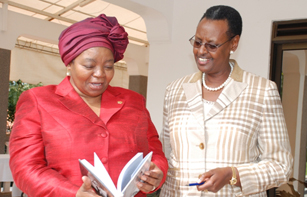
UNAIDS Regional Director for East and Southern Africa, Dr Sheila Tlou (left) with the First Lady of Uganda Janet Kataaha Museveni.
Credit: UNAIDS
UNAIDS Regional Director for East and Southern Africa, Dr Sheila Tlou appealed to Uganda’s First Lady Janet Kataaha Museveni to champion the elimination of new HIV infections among children in the country.
The request was made during Dr Tlou’s official visit to Uganda from 8-9 November 2011 aimed at engaging high level political leadership in support of the Global plan towards the elimination of new HIV infections among children by 2015 and keeping their mothers alive. Uganda is one of the 22 countries who participated in the development of the Global Plan and has committed to implement it.
“We should strive to keep mothers alive so that we do not create more orphans,” said Dr Tlou. “We should also enrol them on antiretroviral therapy as soon as possible so that they can safely continue breastfeeding and ensure that the babies are healthy,” she added.
The Director General of the Uganda AIDS Commission, Dr David Kihumuro Apuuli noted that 150 000 children below 15 years in Uganda are HIV positive, with only 24 000 accessing HIV treatment out of 98 000 who need it. Dr Apuuli also noted that adults, who should be an example to the youths, are the ones contributing to over 50% of new infections mostly because of multiple concurrent partnerships.
The First Lady called on government leaders to ‘re-energize their efforts in HIV prevention. “I think prevention campaigns relaxed and people forgot that HIV is still with us. We need to continue drumming HIV prevention messages, especially regarding the elimination of new HIV infections among children, so that people wake up,” said Ms Museveni. “I have been speaking to the president to talk about HIV. He used to and it worked.”
We need to continue drumming HIV prevention messages, especially regarding the elimination of new HIV infections among children, so that people wake up
First Lady of Uganda Janet Kataaha Museveni
The First Lady Museveni is the founder of the Uganda Women’s Initiative to Save Orphans, and is the patron for the National Youths Forum plus several youth initiatives in HIV and sexual reproductive health.
Ms Museveni who recognized UNAIDS’ work in Uganda, committed to lead the AIDS response. “My traditional area of work focused on young people. But now I’m scattered. It has really distracted me from my calling but I know we really have a challenge. I’m willing to come back on board,” she said.
During her visit, Dr Tlou was also met with the Minister of Health Dr Christine Andoa, Apuuli, and the head of the AIDS Control Programme in the Ministry Of Health Dr Zainab Akol.













